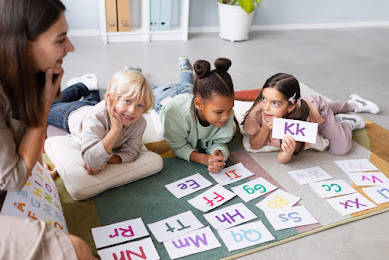Social-emotional learning (SEL) is a critical aspect of child development. It helps children learn how to identify and manage their emotions, build positive relationships, and make responsible decisions. Preschool is a crucial time for children to begin developing these skills. Therefore, promoting SEL in preschoolers is vital for their growth and future success.
Here are some effective strategies for promoting social-emotional learning in preschoolers:
1. Create a Positive Classroom Environment
Creating a positive classroom environment is a crucial step towards promoting SEL in preschoolers. Teachers should create a welcoming and safe space that encourages children to explore, express themselves and learn. This environment can be achieved through simple acts like decorating the classroom with bright colours, allowing students to personalize their space, and using positive reinforcement.
2. Teach Emotion Vocabulary
Children may not know how to express their emotions in words. Teaching them emotional vocabulary is vital in helping them develop their emotional intelligence. Preschool teachers can use picture books, stories, and puppets to help children identify emotions and learn how to communicate them effectively.
3. Encourage Play-Based Learning
Play-based learning is an effective way to promote SEL in preschoolers. Children can learn social-emotional skills through play by practising communication, cooperation, and problem-solving. Teachers can incorporate play-based activities such as role-playing, dress-up, and block-building to develop SEL skills.
4. Model Positive Behaviors
Preschoolers learn by observing and imitating. Therefore, it is crucial for teachers to model positive behaviors such as empathy, kindness, and respect. Teachers should also provide opportunities for children to practice these behaviours by encouraging them to share, take turns, and show kindness towards others.
5. Use Social Stories
Social stories are stories that teach social-emotional skills. They are a helpful tool for teaching preschoolers about emotions, social situations, and appropriate behavior. Teachers can create social stories that are tailored to their classroom and use them during circle time to reinforce SEL concepts. Wanted to develop your child then visit the best kindergarten in Indore.
6. Foster Positive Relationships
Fostering positive relationships is essential in promoting SEL in preschoolers. Teachers should encourage children to develop positive relationships with their peers, family, and community. This can be achieved through group projects, family involvement, and community service.
7. Provide Opportunities for Reflection
Reflection is a critical aspect of SEL. It allows children to think about their emotions, behavior, and decision-making. Teachers can provide opportunities for children to reflect on their actions, thoughts, and feelings through journaling, group discussions, and self-assessments.
Conclusion
Promoting social-emotional learning in preschoolers is vital for their growth and future success. The strategies of kids play school Indore mentioned above can help teachers create a positive classroom environment, teach emotional vocabulary, encourage play-based learning, model positive behaviours, use social stories, foster positive relationships, and provide opportunities for reflection. By incorporating these strategies, preschoolers can develop the necessary social-emotional skills to help them navigate their world successfully.

Comments
Post a Comment